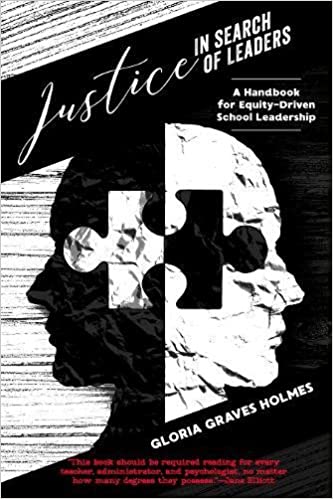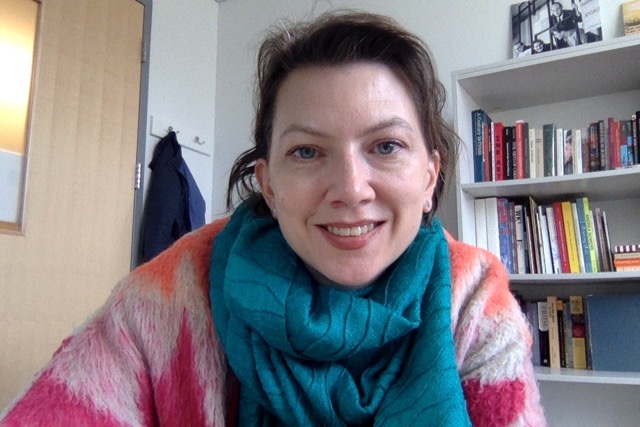OPINION: “COURAGEOUS CONVERSATIONS ON RACE” – A GOOD START

Cover of Gloria Graves Holmes' Justice in Search of Leaders: A Handbook for Equity-Driven School Leadership

Instead of heading to Puffer’s Pond with the family on a hot and humid Saturday afternoon, I recently attended a Zoom webinar entitled “Courageous Conversations about Race, Power, and Privilege,” a presentation of the Amherst Human Rights Commission hosted by Jennifer Moyston from the Amherst Town Manager’s office. It was facilitated by Gloria Graves Holmes, Phd., author of the book Justice in Search of Leaders: A Handbook for Equity-Driven School Leadership and an adjunct professor at the University of South Carolina.
Holmes presented a sort of primer for participants to better understand our own identities and what we can do to fight racism in our local community. The facilitators acknowledged the sense of urgency that brought us together and recognized that people would be joining from a wide range of backgrounds and at different points along a journey – one Holmes emphasized has no end but continues perpetually – toward social justice. The presentation aimed to address the complexity and connection among a wide range of issues that contribute to the systemic racism that structures all aspects of our society. It was an open and respectful conversation that examined how racism harms not only people of color, but white people as well, encouraging our complicity and preventing our understanding of the deep divides and inequities that structure every institution in our society. Holmes took a hopeful tone in emphasizing that when people work together conscientiously to solve shared problems, progress is possible. Both implicit and explicit biases can be unlearned, though it takes hard work and is often an uncomfortable process. At the same time, no one can assume that they are not part of the problem because they are a good person: most slave owners, she reminded us, were God-fearing Christians who surely believed they were good people.
The presentation included some disturbing statistics as well as useful resources to understand the racial politics that so often are swept under the rug in American history, starting with the fact that Thomas Jefferson’s comments in the original draft of the Declaration of Independence explicitly condemning slavery were inexplicably removed from the final document. His recognition of the hypocrisy of founding a country based on ideals of liberty while simultaneously supporting the institution of slavery did not prevent the signers of the text from institutionalizing liberty and justice exclusively for white Euro-Americans and actively maintaining slavery for another 100 years. Almost all of those who signed the Declaration were slaveholders, as filmmaker Arlen Parsa recently pointed out by altering a famous portrait of the founding fathers by John Trumbull. Dr. Holmes also presented a map by the Southern Poverty Law Center from 2015 displaying the locations of 190 Ku Klux Klan groups, 84 Neo-Nazi Groups, 95 White nationalist groups, 95 racist skinhead groups, and a total of 184 “general hate” groups tracked by the Center. According to their current map, at least 940 hate groups are active in the U.S. The presentation included videos from CNN and other sources on how kids of all races internalize white supremacist beliefs at a very young age, how white privilege has prevented the accumulation of wealth among black families, and how even mass-marketed products sometimes display shockingly racist slogans and assumptions.
Holmes defined several important concepts such as “white supremacy,” “racism,” “implicit bias,” and other key terms. She explained how the conventional definition of “racism” as the conscious commitment of a single racist action is inadequate to the reality of a society whose entire economy, history, and political institutions are based on the systemic exclusion and oppression of black people, indigenous people, and people of color. She made clear that “racism is embedded in policies that sustain social inequities,” operating in the way schools are run, how the court system works, the way companies market products, and in the quality of medical care. We know, for example, that people of color are underserved medically in the U.S. and are dying of COVID-19 at dramatically higher rates than white people. The limited definition of racism allows the average white person to declare that they are not a racist, when in fact the systemic nature of white privilege makes every white person an automatic beneficiary of the current system. Holmes referenced several texts by key authors including acclaimed black intellectual James Baldwin, Robin diAngelo, the white author of White Fragility, and Beverly Tatum, the current President of Spelman College and author of the classic book Why Are All the Black Kids Sitting Together in the Cafeteria? among other excellent books. Beverly Tatum visited UMASS for a very productive conversation about race and pedagogy in the classroom that I attended in 2016. Both her research and her generous approach to engaging students and faculty of different backgrounds and comfort levels have been models for my own teaching.
I have been actively researching race for my academic work on contemporary art and culture for the past few years, foregrounding discussions about race and white privilege in the classroom and developing active collaborations for racial justice with faculty and students, so for me the discussion was pretty basic. It took a general tone and did not address specific issues such as police violence that are currently shaping debates about race in town and across the globe. Still, the experience was worthwhile – and important if it opened just one person’s eyes. It was also an important step for the town to take in an official capacity. As Holmes stated, “we need to talk about these things in order for them to change.” Just the public recognition that white people in the audience have so much to learn from black scholars and leaders like the team who convened this session made it valuable.
The ideas presented in the second part of the seminar on “racial socialization,” the process by which people internalize race as a social hierarchy from a very young age, dug a bit deeper. I recently began incorporating terms like “racialization” and “minoritization” in my own teaching because I think they get across the key idea that becoming a raced person is a social and political process. When we talk about “race” as a noun it implies that the term has some natural basis or is unchangeable. In reality, people become racialized and minoritized as they move through society (and in the world as a whole white people have always been in the minority). If we, meaning people of any race, recognize the way that we as active social agents reproduce racial bias on a daily basis, we can start to undo it.
One of the main problems with the event was that it was structured as a presentation not a conversation, and there were no breakout rooms to engage direct conversation among the participants. The organizers explained that they structured it as a webinar as an extra measure of security against zoom-bombing given the potentially difficult nature of the discussion, and emphasized that there may be more interactive sessions to follow. Still, it was a useful review of the foundations for white viewers in particular. While people of color are forced to recognize racism on a daily basis, white people are given the privilege to overlook it, so any opportunity for us, meaning white people, to retool our thinking is a step toward a more equitable society. There were a few pauses for people to consider the material and reflect on their own experiences. The first of these asked us to consider: “If racism is a system, a structure, not an event… what does this mean to you?” I ask myself this question in some way every single day. The related prompts are a good place to start for anyone interested in moving deeper into this process:
How does the knowledge of racism as a systemic, embedded structure that shapes every aspect of society change how I think about race and racism? Does it make me uncomfortable, and if so, why? Does it change my understanding of racial dynamics and the role I play in supporting systemic racism? What steps can I take to move forward?
Karen Kurczynski is Associate Professor of History of Art and Architecture, at UMass Amherst
